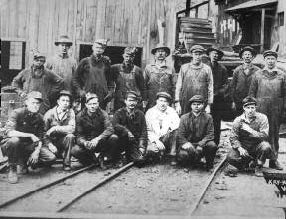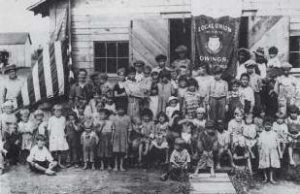History of Militant Class Struggle Inspires Us, but Communism Is Our Future

USA, March 8—Thirty thousand public school teachers, bus drivers, cooks and other school workers across West Virginia ended a nine-day strike after they and other state workers received a 5% pay raise with no increase in health insurance costs.
But these workers need something different from a wage increase. They need to end capitalist wage slavery by mobilizing for communism.
Public-sector workers in West Virginia, including teachers, have no legal right to collective bargaining. They have no legal right to strike. But strike they did! They defied the laws and the officials of the American Federation of Teachers (AFT) who told them to go back to work.

West Virginia Coal Miners, 1921
In the past, West Virginia miners and other workers waged fierce strikes against the deadly conditions in which they toiled for a pittance. They led pitched battles against the coal bosses and their government goons.
The railroad strike of 1877 spread from West Virginia across the US. It culminated in the Pittsburgh Rebellion, which some compared to the Paris Commune of 1871. The mine wars of 1912-22 included the Battle of Blair Mountain (1921), the largest armed insurrection in the US since the Civil War.
Communists helped build multiracial mineworker unions. But they didn’t try to lead these armed class struggles to revolution for communist workers’ power. We have much to learn from both their successes and their limitations and errors.
In the 1960s and 1970s, West Virginia was a hub of huge and frequent “wildcat” strikes that defied union officials’ attempts to suppress class struggle. The recent school strikers were conscious of their debt to these militant industrial workers. They organized themselves through personal relationships and social media. They knew that workers’ power lies, not in laws or unions, but in our ability to shut down the system.
An even greater power lies in workers’ ability to build a new system – communism – based not on capitalist profits but on workers’ needs.
Teachers stepped up, but industrial workers, soldiers and sailors are still key to mobilizing for communist revolution. Energy is still one of the leading industries in West Virginia, along with chemicals, biotech, automotive, and a fast-growing aerospace sector.
Democratic Party politicians and liberal-capitalist news media worry that the decline of unions will open the door for “uprisings” like the teachers’ strike. They want the Supreme Court to decide the Janus case in favor of unions like the AFT that will push voter-registration and, they hope, control the angry masses.
Some leftists will say that this strike shows that workers should “take back” their unions or build new unions. We disagree.
The militant trade-unionism of the past inspires us, but it is not the way forward. Miners fought for health and safety but they still die from black lung today. Industrial workers must mobilize masses for communism.
We can see the potential for communism in the teachers who not only organized themselves but also prepared bags of food for children who weren’t getting school breakfasts and lunches during the strike.
The media and union spin this as “teachers caring about kids.” It’s a lot more than that. It’s the kind of class solidarity learned through a century of class struggle. And this solidarity is the basis of communism.
In communist society there will be no wages (high or low) and no money economy at all. Society will be structured around everyone caring about each other. We’ll organize production on a collective and voluntary basis to meet everyone’s needs. No one will go hungry or have to worry about health care.
Where dangerous work is necessary, the workers themselves will make sure it’s as safe as possible. No profits, no “bottom line” and no reason to cut corners.
Communist education will encourage curiosity, creativity and learning for people of all ages. No longer will the majority be schooled to be passive wage-slaves while a few are taught to believe themselves naturally superior and destined for power and privilege. Workers themselves will plan and carry out this communist education. Everyone will both teach and learn.
Communist education today means drawing revolutionary lessons from class struggles. It means figuring out collectively how we can win and build communist society.
We’re not surprised that the AFT did not go all-out to mobilize its members in solidarity with the striking West Virginia school workers. But we need to be self-critical for not mobilizing communist solidarity ourselves. That’s especially true of our comrade teachers, students and parents who are building the International Communist Workers’ Party (ICWP) in US schools.
Caught up in our daily routines, including important Party work, we didn’t grasp the urgency and potential of this massive strike. We didn’t think about it enough to make the connections. Members and collectives didn’t take the initiative to open discussions or get friends to help write and distribute leaflets—or more.
Let’s start to correct these errors by discussing this article with friends, relatives and co-workers. These strikes may spread. Oklahoma teachers are preparing for April 2. Kentucky may be next. We should be prepared, too.

West Virginia miners’ children

